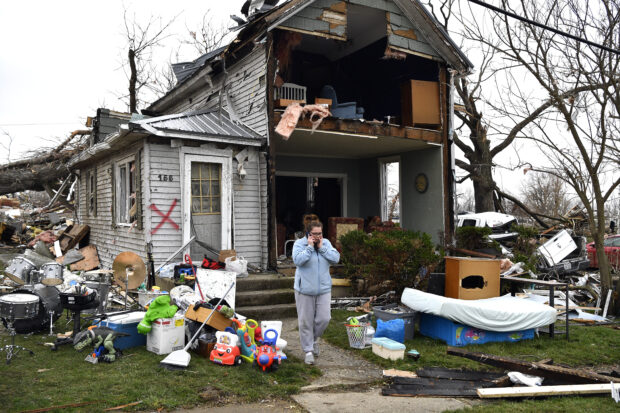Global insured losses from natural catastrophes in the first quarter were estimated at $20 billion, with U.S. claims accounting for more than $15 billion, or 75 percent, of the first-quarter total, according to a Gallagher Re report.
Despite a quarter defined by major events such as several billion-dollar outbreaks of severe convective storms (SCS) in the U.S., a USGS-registered magnitude-7.5 earthquake in Japan and an active European windstorm season, financial costs from natural catastrophes were “manageable,” said Gallagher Re in its report titled Natural Catastrophe and Climate Report: Q1 2024.
The reinsurance broker said the minimum estimated first-quarter natural catastrophe tally of $20 billion in claims was 10 percent higher than the decadal average of $18 billion.
Global economic losses from all natural perils, which include insured and uninsured losses, reached $43 billion, according to a preliminary estimate. That figure is 17 percent lower than the 10-year first-quater average of $52 billion, the report said.
Costliest Natural Catastrophes
Overall, the costliest natural catastrophe peril for insurers was SCS, with the early global estimates exceeding $11 billion. (SCS is an umbrella term for a range of hazards including tornadic and straight-line winds, as well as large hailstones, according to Swiss Re in a recent report.)
Gallagher Re said this marked the second-most expensive first quarter for SCS claims after last year’s record-setting SCS losses of $15 billion in Q1. (During the full year 2023, global SCS insurance claims topped $64 billion, breaking new records, Swiss Re said.)
The Gallagher Re report noted that further loss progression is likely to push the Q1 2024 total higher in the coming months. The typical peak season for U.S. SCS is May through June.
“Most of these losses were incurred in the United States, and further development was likely from the biggest Q1 SCS outbreaks, including three that are already billion-dollar events,” the report said.
Preliminary economic loss estimates for U.S. SCS tentatively stand at $14 billion, with insurers covering more than $10 billion of the total, Gallagher Re said. For the full year 2023, U.S. SCS insurance claims hit a record $63 billion, the report confirmed.
“Hail was again the primary sub-peril [within SCS events], driving the bulk of the insured costs across the central and eastern portions of the U.S.,” Gallagher Re continued. “In any given year, hail drives 50 percent to 80 percent of all thunderstorm related claims.”
Other findings from the report include:
- Two Q1 events topped $3 billion in insured losses: an SCS outbreak in the U.S. (March 12-17) and the Jan. 1 earthquake in Japan.
- A record number of large hail reports (93) in the U.S. of greater than or equal to 2 inches/5.1 centimeters, drove most of the SCS losses.
- The expected rapid shift from El Niño to La Niña conditions could translate to above average activity during the Atlantic hurricane season while spawning other weather or climate extremes around the globe.
- The National Oceanic and Atmospheric Administration currently projects 2024 as having a 99.9 percent chance of being one of the top five warmest years since 1850 and a 55 percent chance as the warmest year.
Photograph: Brittany Oakley checks in with relatives outside of what is left of her home in Lakeview, Ohio, on Friday, March 15, 2024, when severe storms with suspected tornadoes damaged homes and businesses in the central United States. (AP Photo/Timothy D. Easley)





















 Preparing for an AI Native Future
Preparing for an AI Native Future  Lessons From 25 Years Leading Accident & Health at Crum & Forster
Lessons From 25 Years Leading Accident & Health at Crum & Forster  What Analysts Are Saying About the 2026 P/C Insurance Market
What Analysts Are Saying About the 2026 P/C Insurance Market  How Americans Are Using AI at Work: Gallup Poll
How Americans Are Using AI at Work: Gallup Poll 